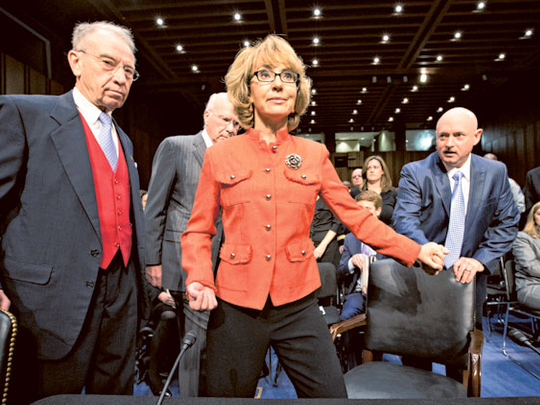
WASHINGTON:A former US congresswoman who was shot in the head in a 2011 mass shooting begged lawmakers at an emotional hearing to act quickly to curb firearms because “Americans are counting on you.” Not everyone agreed, underscoring the national political divide over gun control.
Giffords’ 80-word plea was Wednesday’s most riveting moment, delivered in a hushed, halting voice two years after the Arizona Democrat suffered head wounds in a Tucson shooting spree that killed six people. The session also came two months after 20 first-graders and six women were slain by a gunman who invaded Sandy Hook Elementary School in Newtown, Connecticut.
At the same hearing, a top official of the nation’s most powerful gun lobby group, the National Rifle Association, rejected Democratic proposals to ban assault weapons and high-capacity ammunition magazines and said requiring background checks for all gun purchases would be ineffective because the Obama administration isn’t doing enough to enforce the law as it is.
Even if stronger background checks did identify a criminal, “as long as you let him go, you’re not keeping him from getting a gun and you’re not preventing him from getting to the next crime scene,” said Wayne LaPierre, the NRA’s executive vice president. He said poor enforcement is “a national disgrace.”
Giffords, who retired from Congress last year, focused during her brief appearance on the carnage from armed assailants.
“Too many children are dying,” she said at the Senate Judiciary Committee hearing. “Too many children. We must do something. It will be hard, but the time is now.”
Guiding her in and remaining to testify was Mark Kelly, the retired astronaut who is Giffords’ husband. The couple, who both owns guns, has formed a political action committee called Americans for Responsible Solutions that backs lawmakers who support gun restrictions.
“We’re simply two reasonable Americans who realize we have a problem with gun violence and we need Congress to act,” Kelly said.
Wednesday’s session played out in a hearing room packed to capacity. While both sides appealed to their followers beforehand to arrive early and fill the room, most in the public audience of around 150 appeared to be gun-control sympathizers.
The hearing kicked off a year in which President Barack Obama and members of Congress are promising to make gun restrictions a top priority. Obama has already proposed requiring background checks for all gun sales and reviving both an assault weapons ban and a 10-round limit on the size of ammunition magazines, and several Democrats have introduced bills addressing those and other limitations.
After the hearing, Giffords and Kelly met privately with Obama at the White House.
At the Capitol, senators’ remarks during the hearing illustrated the gulf between the two parties.
Sen. Ted Cruz joined others in lauding Giffords but expressed little interest in curbing firearms.
“Unfortunately in Washington, emotion I think often leads to bad policies,” said Cruz. He said gun control efforts too often “restrain the liberties of law-abiding citizens,” not criminals.
Republicans blamed the nation’s gun troubles on a list of maladies including a lack of civility, violent video games and insufficient attention to people with mental problems. Sen. Charles Grassley, top Republican on the panel, said that while he welcomed the renewed focus on guns, “The deaths in Newtown should not be used to put forward any gun control proposal that’s been floating around for years.”
Democrats countered that a need to improve gun restrictions was obvious. Sen. Charles Schumer said omitting gun limits from the debate “is like not including cigarettes when discussing lung cancer.”
Republicans and the NRA are not the only hurdles Democrats face in trying to push gun legislation through Congress this year. It is also unclear what several Democratic senators facing re-election in Republican-leaning states in 2014 will do, such as including Sens. Max Baucus of Montana, Mark Begich of Alaska and Mark Pryor of Arkansas.
Sen. Patrick Leahy, the committee’s chairman, said he hoped his panel would write gun control legislation next month, though he did not specify what it might contain. In his opening remarks, he voiced support for requiring broader background checks that would help keep criminals and the mentally ill from obtaining firearms, and he has also introduced legislation that would make it a federal crime for someone to purchase a gun for a person who would not be legally allowed to have one.
Giffords, a surprise witness, was helped to her chair as the hearing began by committee Leahy and others. She’d been working on her remarks for a week, but decided to deliver them Tuesday evening, said Pia Carusone, her former chief of staff who is now executive director for Americans for Responsible Solutions.
Kelly recounted the January 2011 attack on Giffords and others and described her battle to regain basic skills.
“Gabby’s gift for speech is a distant memory,” he told the senators. “She struggles to walk, and she is partially blind. Her right arm is completely paralysed. And a year ago she left a job she loved serving the people of Arizona.”
Toward the end of the hearing, Kelly said he had just gotten word of another Arizona shooting that occurred during Wednesday’s session. That shooting in a Phoenix office building left three people wounded, and the shooter was being hunted.
_












